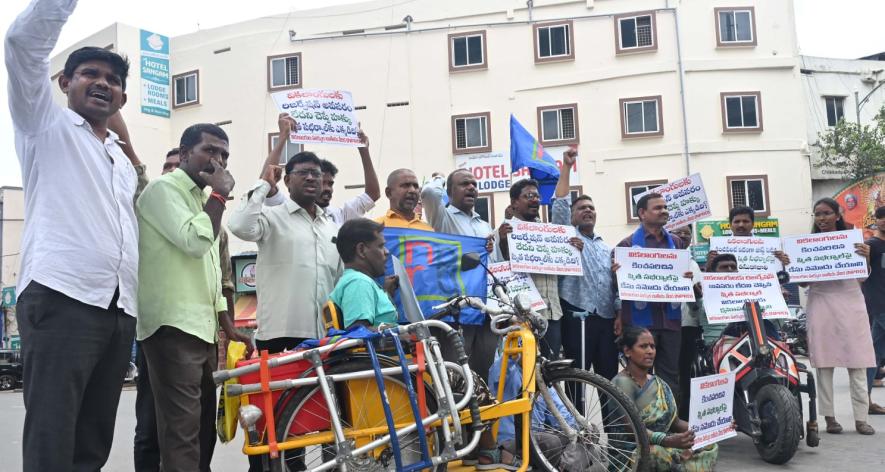Why India Needs to Re-Imagine Disability Justice

A protest by disabled persons in Telangana. (File Photo Credit: NPRD Facebook)
The Disability Pride Month has just passed. Every year, July is celebrated as Disability Pride Month. It owes its genesis to the passing of the American Disabilities Act, popularly known as ADA, in 1990. One may resent this fact, especially in the Global South, that legislation of a nation that has not ratified the Convention on the Rights of Persons with Disabilities is supposedly a cause of pride for the disabled in the rest of the world. However, this debate can be done later.
In India, during this year’s Disability Pride Month, several pertinent developments happened that concern disabled citizens. These developments are profound and warrant our collective attention as they may affect our quality of citizenship in this republic.
It may have been a coincidence that in this Pride Month, the Supreme Court, asserting disability rights, came down heavily on putting a halt to humour that belittles and disparages the disabled, and coeval to that, several social media posts came out alleging that many civil servants have availed the benefit of PwD (Persons with Disability) quota by forging disability certificates.
Sadly, Puja Khedkar's story, which should have started a debate about transparency and accountability of various governmental agencies, had yielded an online vituperative outburst by some senior civil servants, including former NITI Aayog CEO Amitabh Kant and IAS officer Smita Sabharwal against affirmative action in favour of the disabled in All India Services. They came with the familiar cant against reservation for disabled citizens laced with stereotypical ideas. These developments, the welcoming Supreme Court judgement and pushback against affirmative actions for disabled citizens in this year’s Disability Pride Month, may warrant asking some difficult and uncomfortable questions.
Several of our institutions, including civil services, have a colonial continuity. The process of colonisation was not merely a brutal occupation. It came with its governmentality, its exclusionary logic that enabled certain worldviews and ‘bodies.’ Critical disability scholars have pointed out that coloniality privileged European, abled-bodied, heterosexual men as the normative bodily standard against which the bodies of disabled, women, and others were seen as ‘inferior.’ The Vitruvian man remained the poster boy of colonialism.
In post-colonial India, the civil service has valourised the logic of coloniality even though its membership was open to the marginalised. However, this system gave only limited and grudging admission to the marginalised, as evident from these tweets of civil servants. The complaint of Kant and Sabharwal against affirmative action for the disabled comes from the biases of the worldview in which able-bodied men (and, to a limited extent, abled-bodied females) alone occupy the coveted posts of All India Services, even in the post-colonial Indian democratic republic.
This debate also came with some familiar responses. Instead of asserting our lived experiences from our peripheral embodiment, the casual reaction highlighted success stories of disabled surgeons, civil servants, and other disabled civil society actors. Though these success stories debunk the stereotypes presented by these abled-bodied civil servants, they fall short of asking disability justice questions radically.
Mia Mingus, a disabled Korean activist, asserts that for disability justice, the real question should not be how we bring disabled people to the table but rather think about the entire table differently in order to embrace the difference of differently embodied disabled bodies. In doing so, Mingus disavows the ‘we are just like you’ model of disability justice and asserts, ‘We don’t simply join the rank of the privileged; we want to dismantle those ranks and the systems that maintain them.’
These developments in July highlight the fact that liberal interventions in what legal scholar Upendra Baxi called ‘geographies of injustice’ come with their inherent limitations. To remove the attitudinal barriers and our unfreedoms created by structures and able-bodied gaslighting, our disability movement needs to be radically imagined.
The democratic deficit in India’s disability movement is well known. Prominent feminist disability scholar Anita Ghai points out that the agenda of disability rights subsumes agendas that are visible and concerned with a very few middle-class privileged disabled while the majority of disabled are fighting to secure the ‘bare minimum.’
Sadly, such disability discourse and movement present the question of disability as ‘apolitical’ and fighting for mere concessions and accommodation. Such an ‘apolitical’ approach to the question of disability justice fails to appreciate the fact that material conditions shape our lived experiences. Nirmala Erevelles succinctly points out that historical, social, and economic conditions shape our lived experiences of the disabled, and the questions of race, ethnicity, gender, and nation mediate these experiences.
Hence, India’s disability justice must challenge the various manifestations of hegemonic masculinities of post-colonial India. To do so, the disability movement must reinvent itself to travel beyond the liberal discourse of pride and empowerment. It should be a movement to imagine the word anew, putting our non-normative embodiment at the core of this republic discourse, and it should be truly democratic. It should reject the able-bodied normativity and its gaslighting.
Vijay K. Tiwari is an Assistant Professor at The West Bengal National University of Juridical Sciences, Kolkata.
Muralidharan is General Secretary of the National Platform for the Rights of the Disabled (NPRD). The views are personal.
Get the latest reports & analysis with people's perspective on Protests, movements & deep analytical videos, discussions of the current affairs in your Telegram app. Subscribe to NewsClick's Telegram channel & get Real-Time updates on stories, as they get published on our website.
























